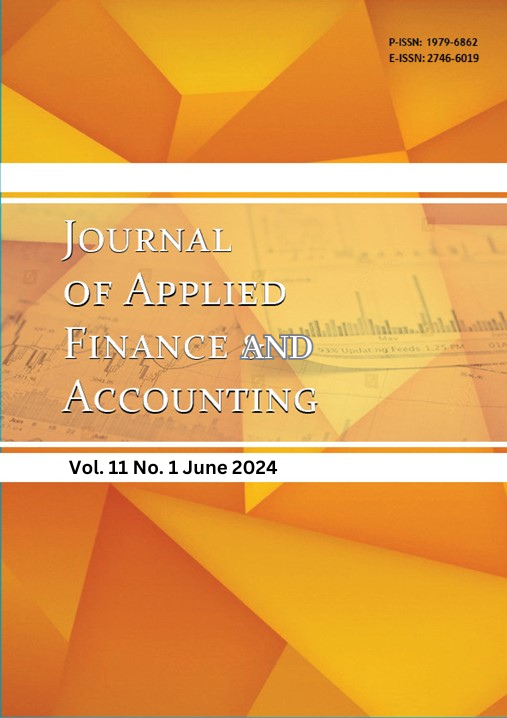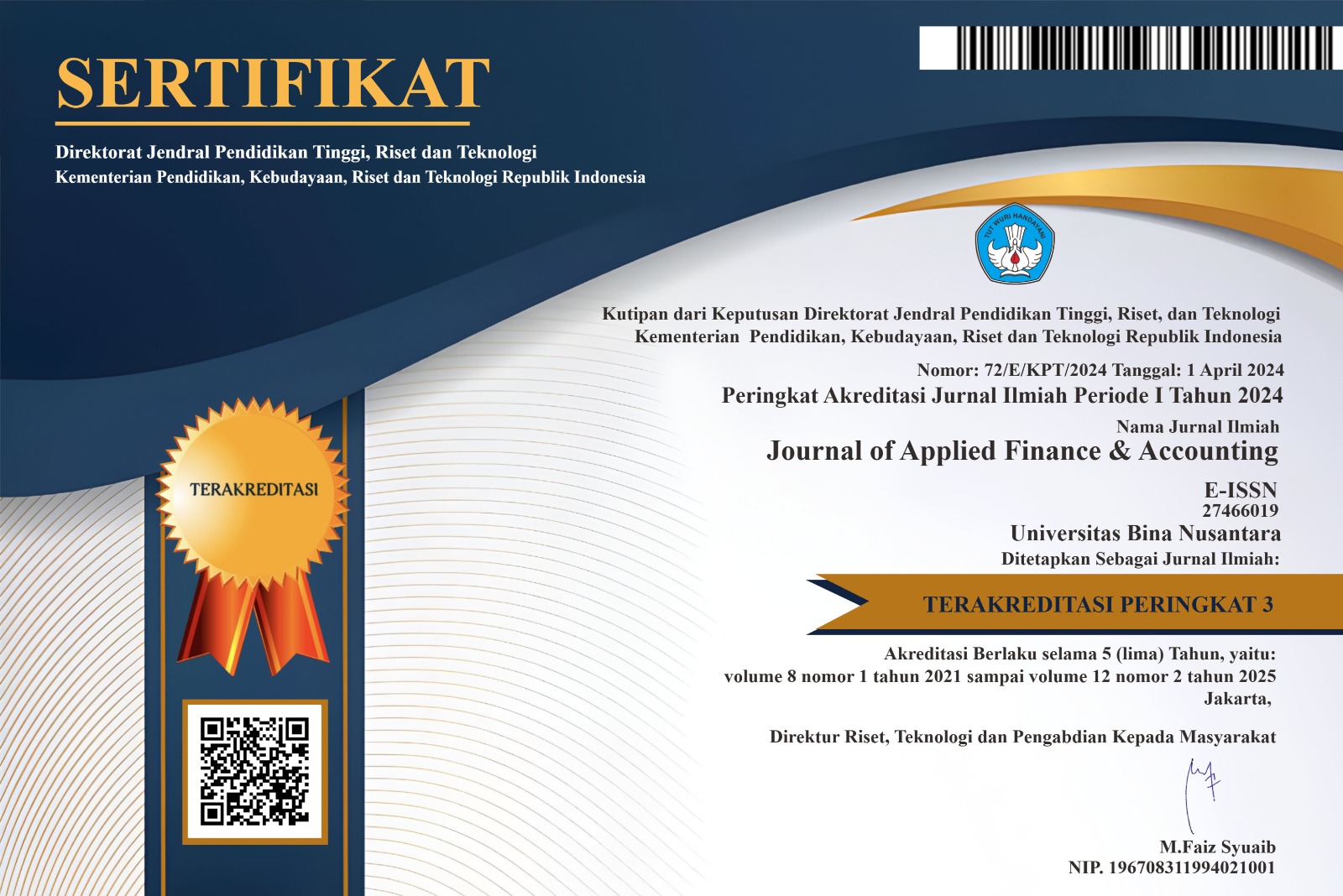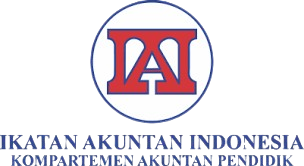WASTE AND EFFLUENT DISCLOSURE: CASE STUDY OF HEALTHCARE COMPANIES LISTED ON THE INDONESIA STOCK EXCHANGE
DOI:
https://doi.org/10.21512/jafa.v11i1.11131Keywords:
Waste, Effluent, Disclosure, GRI-G4, Health IndustryAbstract
This research seeks to determine the level of information disclosure by health companies in Indonesia about their corporate social responsibility (CSR) in terms of their waste and effluent treatment based on the Global Reporting Initiative’s G4 (GRI-G4) guidelines were used as the reporting standard. The population in this study comprises healthcare companies listed on the Indonesia Stock Exchange. Samples were taken by using purposive sampling method. Content analysis was performed for the sample companies’ annual reports and financial statements for the period 2018–2020. The analysis results indicate that the level of information disclosure by health companies in Indonesia regarding their CSR in terms of their waste and effluent treatment is still low. Most companies disclose a minimal amount of information and do not comply with GRI-G4 standards; only a few companies disclose the required information in accordance with GRI-G4 standards. The results of research provide the valuable knowledge for the healthcare industry about its importance of having a good mitigation or treatment system for the B3 and non-B3 waste. Moreover, the health industry is the biggest contributors of B3 waste in Indonesia.
References
Arena, C., Liong, R., & Vourvachis, P. (2018). Carrot or Stick: CSR disclosures by Southeast Asian companies. Sustainability Accounting, Management and Policy Journal. Vol. 9 No. 4, pp. 422-454. https://doi.org/10.1108/SAMPJ-06-2016-0037.
Arikunto, S. (2010). Research Procedures A Practical Approach. Jakarta: Rineka Cipta.
Arka, Y. A. (2022, Beware of Hazardous Waste from Industry, Integrated Management System Becomes a Solution. Jakarta, DKI Jakarta, Indonesia.
Berger, I.E., Cunningham, P.H. and Drumwright, M.E. (2007), “Mainstreaming corporate social responsibility: developing markets of virtue”, California Management Review, Vol. 49 No. 4, pp. 132-57.
Connelly, B. L., Certo, S. T., Ireland, R. D., & Reutzel, C. R. (2011). Signaling theory: A review and assessment. Journal of Management, 37(1), 39-67.
Darwin, R. (2004). Effects of greenhouse gas emissions on world agriculture, food consumption, and economic welfare. Climatic Change, 66(1/2), 191-238.
Fassin, Yves. 2009. “The Stakeholder Model Refined”. Journal of Business Ethics, D/7012/13.
Ginting, (2007), Sistem Produksi, Yogyakarta, Graha Ilmu.
Harahap, S. S. (2011). Critical Analysis of the Company’s Financial Statements. Jakarta: Raja Grafindo Persada.
Harmoni, A., & Andriyani, A. (2008). Disclosure of Corporate Social Responsibility (CSR) on the Official Website of the Study Company at PT. UNILEVER INDONESIA Tbk. In Proceeding, National Scientific Seminar on Computers and Intelligence Systems (KOMMIT 2008) Auditorium Gunadarma University, Depok, 20-21 August 2008.
Humphreys, M, and Brown, A. D. 2008), “An Analysis of Corporate Social Responsibility at Credit Line: A Narrative Approach”, Journal of Business Ethics, 80, pp 403-418.
Kamaliah, K. (2020). Disclosure of corporate social responsibility (CSR) and its implications on company value as a result of the impact of corporate governance and profitability. International Journal of Law and Management, 62(4), 339-354.
Krippendorff, K. (1980). Content analysis: An Introduction to its Methodology. Sage Publications Inc., Newbury Park, CA.
Ministry of Environment and Forestry, 2016, Regulation No.68/ 2016
Patten, D. M. (2002). The relation between environmental performance and environmental disclosure: A research note. Accounting, Organizations and Society, Vol. 27, No. 8, pp. 763–773.
Raimi, L., Adelopo, A. O., & Yusuf, H. (2019). Corporate social responsibility and sustainable management of solid wastes and effluents in Lagos megacity Nigeria. Social Responsibility Journal.
Raimi, L., Adelopo, A.O. and Yusuf, H. (2019), "Corporate social responsibility and sustainable management of solid wastes and effluents in Lagos megacity Nigeria", Social Responsibility Journal, Vol. 15 No. 6, pp. 742-761. https://doi.org/10.1108/SRJ-09-2018-0239.
Reverte, C. 2009. Determinants of Corporate Social Responsibility Disclosure Ratings by Spanish Listed Firms. Journal of Business Ethics, 88, pp: 351-366
Suchman, Mark C. 1995. Managing Legitimacy: Strategic and Institutional Approaches. The Academy of Management Review Vol. 20 No. 3. pp. 571-610. http://www.jstor.org/stable/258788.
Vaaland, T.I., Heide, M. and Grønhaug, K. (2008), "Corporate social responsibility: investigating theory and research in the marketing context", European Journal of Marketing, Vol. 42 No. 9/10, pp. 927-953. https://doi.org/10.1108/03090560810891082.
Vourvachis, P. and Woodward, T. (2015). Content analysis in social and environmental reporting research: trends and challenges. Journal of Applied Accounting Research, 16 (2), 166-195.
Widiastuti, H., Utami, E. R., & Handoko, R. (2018). The effect of company size, industry type, growth, and media exposure on the disclosure of corporate social responsibility (empirical study on companies listed on the Indonesian stock exchange in 2014-2015). Indonesian Accounting and Finance Research, 3(2), 107-117.
Downloads
Published
Issue
Section
License
Authors who publish with this journal agree to the following terms:
Authors retain copyright and grant the journal right of first publication with the work simultaneously licensed under a Creative Commons Attribution License that allows others to share the work with an acknowledgement of the work's authorship and initial publication in this journal.
Authors are able to enter into separate, additional contractual arrangements for the non-exclusive distribution of the journal's published version of the work (e.g., post it to an institutional repository or publish it in a book), with an acknowledgement of its initial publication in this journal.
Authors are permitted and encouraged to post their work online (e.g., in institutional repositories or on their website) prior to and during the submission process, as it can lead to productive exchanges, as well as earlier and greater citation of published work (See The Effect of Open Access).





